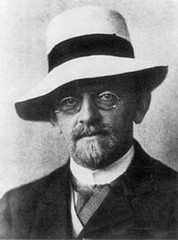| David Hilbert Image by aldoaldoz via Flickr |
Today marks the 150th anniversary of the birth of David Hilbert. Hilbert was a German mathematician, recognized as one of the most influential mathematicians of the 19th and 20th centuries. Much of his work was not of direct relevance to A-Level mathematics, but his greatness demands a mention in this blog.
Hilbert worked in many areas of mathematics and developed many fundamental theorems. He also formulated the theory of Hilbert spaces, one of the cornerstones of the emerging "functional analysis". But he is perhaps most famous for his collection of problems that set the course for much of the mathematical research of the 20th century. He presented 10 of these unsolved problems at the Paris conference of the International Congress of Mathematicians, with the complete set of 23 published in 1902 in the Bulletin of the American Mathematical Society.
Many of Hilbert's problems remain unsolved, including the famous Riemann hypothesis. Many mathematicians believe the Riemann hypothesis to be unsolvable, at least given the current confines of mathematical knowledge and methodology.
But all of the problems generated a vast amount of research and investigation throughout the 20th century. They have led to new mathematical techniques and ideas, which may never have come about were it not for the problems posed.
Hilbert's 23 problems at the turn of the 20th century inspired another list of unsolved problems one hundred years later, at the turn of the millennium. The 21st century list of seven Millennium Prize Problems was chosen in 2000 by the Clay Mathematics Institute. Unlike the Hilbert problems, which offered no rewards, the solution of each problem included a million dollar prize. One of the Millennium Prize Problems, the Poincaré conjecture, was solved relatively quickly, with the Russian Grigori Perelman presenting the solution in 2002 and 2003. He famously turned down the prize money and the prestigious Fields Medal that was offered.
Hilbert strived to establish rigor in all mathematics and developed important tools used in modern mathematical physics and he is known as one of the founders of proof theory and mathematical logic.
Modern mathematics would be in a different, poorer place if it were not for the work of David Hilbert, who would have been 150 today.

No comments:
Post a Comment
Note: only a member of this blog may post a comment.